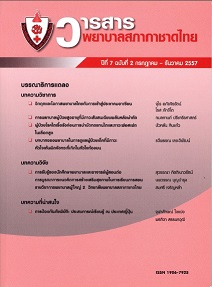การรับรู้ของนักศึกษาพยาบาลและอาจารย์ผู้สอนต่อ การบูรณาการแนวคิดการสร้างเสริมสุขภาพในการเรียนการสอน รายวิชาการพยาบาลผู้ใหญ่ 2 วิทยาลัยพยาบาลสภากาชาดไทย
Keywords:
สร้างเสริมสุขภาพ, การจัดการเรียนการสอน, การพยาบาลผู้ใหญ่, นักศึกษาพยาบาล, health promotion concepts, teaching and learning, adult nursing, nursing studentsAbstract
การวิจัยมีวัตถุประสงค์เพื่อศึกษาการรับรู้ของนักศึกษาพยาบาลและอาจารย์ผู้สอนต่อการบูรณาการแนวคิดการสร้างเสริมสุขภาพในการเรียนการสอนรายวิชาการพยาบาลผู้ใหญ่ 2 กลุ่มตัวอย่างเป็นนักศึกษาพยาบาลชั้นปีที่ 3 หลักสูตรพยาบาลศาสตรบัณฑิต วิทยาลัยพยาบาลสภากาชาดไทย ที่ผ่านการเรียนวิชาการพยาบาลผู้ใหญ่ 2 ปีการศึกษา 2552 จำนวน 154 คนและอาจารย์ผู้สอนรายวิชาการพยาบาลผู้ใหญ่ 2 จำนวน 7 คน เก็บข้อมูลโดยแบบสอบถามและการสัมภาษณ์ ข้อมูลเชิงปริมาณวิเคราะห์โดยใช้สถิติ ความถี่ ร้อยละ ค่าเฉลี่ยและส่วนเบี่ยงเบนมาตรฐาน ข้อมูลเชิงคุณภาพใช้วิธีการวิเคราะห์เนื้อหา( Content analysis method) ผลการวิจัยพบว่า นักศึกษาพยาบาลรับรู้ว่า มีการระบุเนื้อหาที่ครอบคลุมการสร้างเสริมสุขภาพลงในลักษณะวิชา วัตถุประสงค์รายวิชา และ วัตถุประสงค์ในหัวข้อย่อย คิดเป็นร้อยละ 86.4, 83.8 และ 79.9 ตามลำดับ ส่วนอาจารย์ผู้สอนรับรู้ว่า มีการระบุเนื้อหาที่ครอบคลุมการสร้างเสริมสุขภาพลงในลักษณะวิชา วัตถุประสงค์รายวิชา และ วัตถุประสงค์ในหัวข้อย่อย คิดเป็นร้อยละ 100, 42.9 และ 57.1 ตามลำดับ คะแนนเฉลี่ยการรับรู้การนำมโนทัศน์หลักด้านการสร้างเสริมสุขภาพมาใช้สูงสุดของนักศึกษาพยาบาลและอาจารย์ผู้สอนคือ การส่งเสริมสุขภาพและการป้องกันความเจ็บป่วยในวัยผู้ใหญ่และผู้สูงอายุ (M=3.87, SD=0.91 และ M=3.71, SD=0.76 ตามลำดับ) คะแนนเฉลี่ยการรับรู้แนวคิด/กลวิธีสร้างเสริมสุขภาพที่ใช้ในการเรียนการสอนสูงสุดของนักศึกษาพยาบาลคือทฤษฎีปรับเปลี่ยนพฤติกรรม (M=3.43, SD=0.92) ส่วนการรับรู้ว่าแนวคิด/กลวิธีสร้างเสริมสุขภาพที่ใช้ในการเรียนการสอนสูงสุดของอาจารย์ผู้สอนคือการปรับเปลี่ยนความเชื่อและความคิด คิดเป็นร้อยละ 57.1 สำหรับคะแนนการรับรู้สมรรถนะการสร้างเสริมสุขภาพรวม 5 ด้าน นักศึกษาพยาบาลมีการรับรู้ในระดับปานกลาง (M=3.49, SD=0.26) โดยพบว่าสมรรถนะที่ 2 ด้านการปฏิบัติกิจกรรมสร้างเสริมสุขภาพนักศึกษาพยาบาลมีการรับรู้ในระดับดีมากที่สุด (M=3.55, SD=0.20) ส่วนผลการวิเคราะห์ข้อมูลเชิงคุณภาพ พบว่ามีการสอดแทรกแนวคิดด้านการสร้างเสริมสุขภาพในการเรียนการสอน แต่ขาดการเลือกใช้แนวคิดด้านการสร้างเสริมสุขภาพที่เฉพาะเจาะจงอย่างชัดเจน
สรุปและข้อเสนอแนะ: ในการบูรณาการแนวคิดการสร้างเสริมสุขภาพในการจัดการเรียนการสอนรายวิชาการพยาบาลผู้ใหญ่ 2 ควรมีการระบุมโนทัศน์หลักและแนวคิด/กลวิธีด้านการสร้างเสริมสุขภาพที่เฉพาะเจาะจงไว้ในวัตถุประสงค์ของรายวิชาและหัวข้อย่อยให้ชัดเจน ทั้งนี้ควรมีการพัฒนาผู้สอนให้มีความเข้าใจแนวคิดด้านการสร้างเสริมสุขภาพและมีการกำหนดแนวทางการสอดแทรกแนวคิดดังกล่าวไว้ในเนื้อหารายวิชาให้ชัดเจน
Nursing students and nursing instructors’ perceptions on the integration of health promotion concepts in teaching and learning of Adult Nursing 2 at The Thai Red Cross College of Nursing
The objective of the study was to explore the perceptions of nursing students and nursing instructors on the integration of health promotion concepts in the teaching and learning of adult nursing 2. The sample comprised 154 junior nursing students and 7 nurse instructors in the Thai Red Cross College of Nursing. A questionnaire and structured interview were used as the research methods for the data collection of this study. Statistic factors of percentage, frequency, mean and standard deviation were used as quantitative analysis for the data. Content analysis was used as qualitative analysis. The results revealed that the students perceived the integration of the concept of health promotion in course description, course objectives and topic objectives as 86.4%, 83.8% and 79.9%, respectively. In comparison, the instructors perceived these three topics at 100%, 42.9% and 57.1%, respectively. Both students and instructors perceived that the most frequent use of the concepts were in the dimension of health promotion and prevention of illness in adults and aging with mean scores of 3.87 (SD = 0.91) and 3.71 (SD = 0.76), respectively. Theory of behavior change was used with the highest mean score of 3.43 (SD =0.92) as perceived by the students. For the instructors, the theory of cognitive process modification was used with the highest percent of 57.1%. The study also revealed that the health promotion competency as perceived by the students was at the moderate level with a mean score of 3.49 (SD=0.26). Additionally, the second aspect of competency in practice activities in health promotion was at a good level with a mean score of 3.55 (SD= 0.20). According to the qualitative analysis, it was found that the concept of health promotion was inserted in the content of teaching and learning of adult nursing 2, but appropriate selection about the specific concept was still not clearly identied.
Conclusion and recommendation: In the case of integrating health promotion concepts in the teaching and learning of adult nursing 2, it is essential to clearly identify the specific concepts of health promotion in the objectives and contents. Simultaneously, enhancement of the understanding of the health promotion concepts and their usages should be provided to the nurse instructors.
Downloads
Issue
Section
License
เนื้อหาบทความหรือข้อคิดเห็นต่างๆ ในวารสารพยาบาลสภากาชาดไทยนี้ เป็นความคิดเห็นของผู้เขียนบทความ ไม่ใช่ความเห็นของกองบรรณาธิการ หรือสถาบันการพยาบาลศรีสวรินทิรา สภากาชาดไทย






